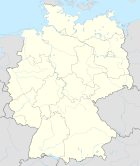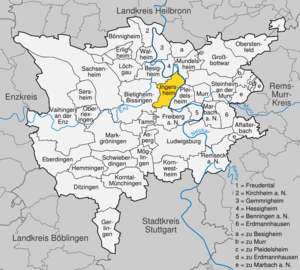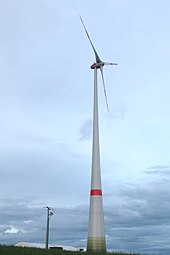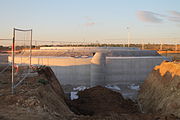Ingersheim (Neckar)
| coat of arms | Germany map | |
|---|---|---|

|
Coordinates: 48 ° 58 ' N , 9 ° 12' E |
|
| Basic data | ||
| State : | Baden-Württemberg | |
| Administrative region : | Stuttgart | |
| County : | Ludwigsburg | |
| Height : | 254 m above sea level NHN | |
| Area : | 11.55 km 2 | |
| Residents: | 6330 (December 31, 2018) | |
| Population density : | 548 inhabitants per km 2 | |
| Postal code : | 74379 | |
| Area code : | 07142 | |
| License plate : | LB, VAI | |
| Community key : | 08 1 18 077 | |
| Address of the municipal administration: |
Hindenburgplatz 10 74379 Ingersheim, Germany |
|
| Website : | ||
| Mayor : | Simone Haist | |
| Location of the community Ingersheim in the district of Ludwigsburg | ||
Ingersheim is a municipality in the Ludwigsburg district . It belongs to the Stuttgart region (until 1992 the Middle Neckar region ) and the European metropolitan region of Stuttgart .
geography
Geographical location
Ingersheim is located on the western bank of the Neckar about 20 kilometers (measured as the crow flies) north of Stuttgart . The lowest point is at 182 m above sea level. NN on the Neckar, the highest point at 310 m above sea level. NN in the garment Bürkle. The eastern boundary of the district essentially forms the Neckar, in the north the Saalenwald, in the west along the Bietigheim forest and in the south the Brandholz.
Neighboring communities
The neighboring municipalities of Ingersheim are in turn the municipalities of Hessigheim in the north, Mundelsheim in the northeast, Pleidelsheim in the east, as well as the cities Freiberg am Neckar in the south, Bietigheim-Bissingen in the west and Besigheim in the northwest. They all also belong to the Ludwigsburg district.
Community structure
Ingersheim consists of the formerly independent communities Großingersheim and Kleiningersheim. The village of Großingersheim belongs to the former community of Großingersheim. The village of Kleiningersheim, the Talhof homestead and the Kleiningersheimer Mühle house belong to the former municipality of Kleiningersheim.
Division of space

According to data from the State Statistical Office , as of 2014.
history
middle Ages
Ingersheim was first mentioned in a document from the Lorsch Monastery ( Lorsch Codex ) in 779 . It can no longer be determined whether it was Großingersheim or Kleiningersheim. But probably Grossingersheim. Archaeological finds in the Großingersheim area indicate an early medieval settlement from the Franconian-Merovingian period. In the early Middle Ages Ingersheim was a main town for the Counts of Calw with its own court.
At the beginning of the 15th century Ingersheim became Baden, followed by an electoral Palatinate rule. In 1504 Ulrich von Württemberg took possession of the two current suburbs, which have been part of Württemberg ever since.
Modern times
After the Kingdom of Württemberg was founded , Ingersheim belonged to the Bietigheim office until 1810 , then to the Besigheim office . In 1938, as part of a regional reform in Württemberg during the Nazi era , the suburbs of Groß- and Kleiningersheim, which were formed in 1829, became part of the Ludwigsburg district .
During the Second World War, Großingersheim was significantly destroyed in a bombing raid on December 16, 1944 and was initially occupied by French troops on April 21, 1945. After the war, however, the place became part of the American zone of occupation and thus belonged to the newly founded state of Württemberg-Baden , which was incorporated into the current state of Baden-Württemberg in 1952.
Today's Ingersheim was formed on January 1, 1972 from the two previously independent communities Großingersheim and Kleiningersheim. The separation of the two "Ingersheims" that took place in 1829 was thus reversed.
Population development
Population figures according to the respective area. The numbers are census results (¹) or official updates from the Baden-Württemberg State Statistical Office (only main residences ).
|
|
Religions
Ingersheim has been predominantly Protestant since the Reformation . Even today there is a Protestant parish in each of the two districts . While the Roman Catholic community in Pleidelsheim is responsible for the Catholics , there is an Evangelical Methodist community in Ingersheim . The New Apostolic Church also has its own congregation in Ingersheim. In 1981 the previously independent parishes of the two districts were united in a new church in Großingersheim.
politics
Municipal council
The municipal council in Ingersheim has 18 members. The local election on May 26, 2019 led to the following result: The local council consists of the elected honorary councilors and the mayor as chairman. The mayor is entitled to vote in the municipal council.
| Parties and constituencies |
% 2019 |
Seats 2019 |
% 2014 |
Seats 2014 |
Local elections 2019
% 40 30th 20th 10
0
34.89%
22.93%
16.91%
11.46%
8.13%
5.68%
n. k.
Gains and losses
|
|
| FW | Free voter community Ingersheim | 34.89 | 6th | 32.28 | 6th | |
| SPD-FB | Social Democratic Party of Germany - Progressive Citizens | 22.93 | 4th | 25.04 | 4th | |
| CDU | Christian Democratic Union of Germany | 16.91 | 3 | 23.43 | 4th | |
| WE | WE - Citizens for Ingersheim | 11.46 | 2 | 10.75 | 2 | |
| With | Mitreden - Mitreden - Mitschalten | 8.13 | 2 | - | - | |
| FDP | Free Democratic Party | 5.68 | 1 | - | - | |
| GREEN | Alliance 90 / The Greens | - | - | 8.50 | 2 | |
| total | 100.0 | 18th | 100.0 | 18th | ||
| voter turnout | 61.93% | 53.60% | ||||
mayor
- 1945–1964: Karl Braun (SPD)
- 1964–1996: Martin Maier
- 1996–2020: Volker Godel (FDP)
- from May 2020: Simone Haist
coat of arms
The municipal coat of arms shows a silver anchor with silver rope in red. The municipality flag is white and red. The municipality's coat of arms and flag were awarded on December 18, 1972.
The anchor has been proven as a landmark of both places since the 18th century, which formed a common municipality up to 1829. He refers to the Neckar shipping. Later, the Großingersheim coat of arms was "In gold a blue anchor with blue rope", the Kleiningersheimer "In red a silver anchor." Kleiningersheim was also awarded a municipal flag in the colors white and red on June 11, 1955. After the renewed merger of Groß- and Kleiningersheim in 1972, the Großingersheimer shape of the anchor and the colors of Kleiningersheim were adopted.
Coats of arms of the districts
Partnerships
The partner municipality has been the French municipality of the same name in Ingersheim in Alsace since 1999 .
Culture and sights
Buildings
Grossingersheim old town hall
The old town hall is a former nursing yard of the Pforzheim women's monastery . It was taken over by the municipality in 1570 and expanded into the town hall. The house was rebuilt several times, most recently in 1958. In 1995/96 it was replaced by a new building as the headquarters of the administration. Today is in the old town hall u. a. housed the municipal archive.
Martin's Church in Grossingersheim
The Martinskirche is a former fortified church that was surrounded by a high wall. This was largely removed. Visible defense elements have been preserved in the tower and the former mantle wall. The lower tower floors and the south wall date from the 12th century. The late Gothic choir was built around 1460. During a renovation in 1961/62, important wall paintings were uncovered in the choir, including a monumental group of figures on the north wall, a group of evangelists in the cross vault and a large wall painting on the south wall. A special feature of its kind is the tracery staircase on the outside of the church.
Georgskirche Kleiningersheim
The Georgskirche was built in 1601 under the direction of the Stuttgart builder Hans Braun, an employee of Heinrich Schickhard. In the chaos of war in the 17th century, the interior of the church was destroyed and valuable objects stolen. The octagonal bell chamber is particularly worth seeing.
Kleiningersheim Castle
Built in the 16th century in the immediate vicinity of a ruined castle by the knight Caspar Nothaft in the Renaissance style. Concerts are held in the inner courtyard in summer. The castle is one of the filming locations of the SWR series The Church remains in the village .
Kleiningersheimer mill
The mill can be traced back to the 14th century and is located directly below the castle. It has been destroyed and rebuilt several times over the centuries. Mill operations were stopped at the beginning of the 20th century.
photos
Natural monuments
The bank of the Neckar in the Ingersheimer Wiesental is part of the Altneckar nature reserve , one of the last near-natural river sections of the Neckar in the Stuttgart administrative region.
Infrastructure
traffic
Ingersheim can be reached by car via the Pleidelsheim exit on the A 81 and then via the L 1125. The closest train station is Bietigheim-Bissingen . There is a connection to the S-Bahn system of the state capital Stuttgart. Public transport connection by bus and a. to Bietigheim-Bissingen and Ludwigsburg (via Freiberg am Neckar).
education
With the Schiller School , Ingersheim has its own elementary school . There are also four kindergartens in town. There are secondary schools only in the neighboring towns.
Supply and disposal
The power grid in the Großingersheim district is operated by EnBW Regional AG, and in the Kleiningersheim district by Syna GmbH.
There is only a gas supply in Großingersheim, operated by Syna GmbH.
To supply drinking water , the municipality of Ingersheim pumps groundwater from its own wells (Epple and Talbrunnen) and pumps it via a pressure line to the Weiden elevated tank . There it is mixed with external water from the Lake Constance water supply .
The wastewater from the municipality of Ingersheim is pumped through a 4.6 km long pressure line to the Bietigheim-Bissingen sewage treatment plant and cleaned there.
The waste is taken from the Abfallverwertungsgesellschaft the district Ludwigsburg mbH (AVL), a 100% subsidiary of the district Ludwigsburg. AVL is commissioned to carry out the tasks of avoiding, recycling and disposing of waste on behalf of the Ludwigsburg district.
economy
General
Ingersheim has several commercial areas with smaller craft and industrial companies. The place is also characterized by agriculture (grain, corn, sugar beet, fruit growing) and a traditional wine place . There is an independent Raiffeisenbank Ingersheim eG with a branch in Kleiningersheim and a branch of the Kreissparkasse Ludwigsburg .
Wind turbine
A wind turbine was built on the hill above Ingersheim by April 2012 . The facility is not far from the L 1113 (Besigheimer Straße), around one kilometer north of the Groß-Ingersheim district of Ingersheim, 1.5 km west of Klein-Ingersheim and 500 m south of the Besigheimer Sprengsels Husarenhof (geographical coordinates: 48 ° 58 ′ 28 ″ N , 9 ° 10 ′ 18 ″ E ). The base is based on around 300 m above sea level. NHN .
It is financed and operated by the Ingersheim energy cooperative . According to its own information, the energy cooperative has more than 360 members. These participate with a share of € 2500 or more. More than 75% of the members come from Ingersheim and other communities in the vicinity.
Technical specifications
The Enercon E-82 system, with a hub height of 138.6 m and a total height of 179.6 m, has an electrical output of 2 MW . Systems of this type are currently among the most frequently installed wind turbines in Germany. The facility is based on a reinforced concrete foundation 19.6 m in diameter and 3.45 m deep. The hybrid tower, which consists of prefabricated reinforced concrete parts in the lower area and steel in the upper area, has a mass of around 1650 t. The mass of the nacelle is 120.4 t. As of April 2012, the system is the fifth tallest structure in the Stuttgart region after the chimneys of the Altbach power plant , the Stuttgart television tower , the telecommunications tower on the Frauenkopf and the chimney of the Stuttgart-Münster power plant .
The grid is fed into the grid using an inverter , also from Enercon ; the transfer station is located around 200 m west of the wind turbine.
Construction history and progress
Years of preliminary considerations, investigations and controversial discussions preceded the construction. So was z. B. in Ingersheim, on the Besigheimer Sprengsel Husarenhof and in Besigheim the citizens' initiative Gegenwind Husarenhof was formed, which offered resistance to the construction of the wind turbine.
In January 2011, the building was finally approved by Ludwigsburg District Administrator Rainer Haas. Even before the official start of construction on September 17, 2011, construction work was in progress. On March 15, 2012, the exterior of the construction was completed with the assembly of the wings. The plant was officially put into operation on April 15, 2012; At that time it was still running in trial operation.
Personalities
Honorary citizen
- 1967, Karl Braun (1897–1983), Mayor from 1945 to 1964, Member of the State Parliament in Baden-Württemberg (SPD)
Sons and daughters of the church
- Heinrich Bach (1812–1870), officer, cartographer and geologist
- Louis Leitz (1846–1918), inventor of the Leitz folder
- Karl Braun (1897–1983), politician (SPD), member of the state parliament
- Hartmut Engler (* 1961), singer of the music group Pur
Personalities who have worked on site
- Harald Leibrecht (* 1961), politician, FDP, member of the Bundestag from 2002 to 2013, lives in Kleiningersheim
- Joe Crawford b. Weber (* 1963), bass player in the music group Pur
literature
- To Kleiningersheim Castle → Harald Stark : The Notthracht family - looking for traces in Egerland, Bavaria and Swabia , Weißenstadt 2006, ISBN 3-926621-46-X
- Richard Stein: History of the localities Groß- and Kleiningersheim. Stuttgart 1903. [The author was a pastor in Kleiningersheim.]
Individual evidence
- ↑ State Statistical Office Baden-Württemberg - Population by nationality and gender on December 31, 2018 (CSV file) ( help on this ).
- ^ The state of Baden-Württemberg. Official description by district and municipality. Volume III: Stuttgart District, Middle Neckar Regional Association. Kohlhammer, Stuttgart 1978, ISBN 3-17-004758-2 . Pp. 393-395
- ↑ State Statistical Office, area since 1988 according to actual use for Ingersheim.
- ↑ Population development in Baden-Württemberg from 1871 to 2012 ( page no longer available , search in web archives ) Info: The link was automatically marked as defective. Please check the link according to the instructions and then remove this notice.
- ↑ ITEOS
- ^ Markus Otto: Post-Reformation paintings in the churches of the Ludwigsburg district . In: Ludwigsburger Geschichtsblätter XVI , 1964, pp. 30–56, here pp. 36–39.
- ↑ Unless other sources are explicitly mentioned, the information comes from the Ingersheim energy cooperative website ; Accessed February 29, 2012
- ^ Collection of press articles , compiled by the project opponents, accessed on February 29, 2012.
- ^ Website of the opponents , accessed on February 29, 2012
- ↑ 3.5 million for Riesen-Rotor , Stuttgarter Nachrichten , January 15, 2011, accessed on February 29, 2012
- ↑ Press release from the Ludwigsburg District Office , accessed on February 29, 2012
- ↑ Angelika Baumeister: The excavators for the large wind turbine have already arrived . In: Ludwigsburger Kreiszeitung . September 19, 2011 ( lkz.de [accessed September 30, 2011]).
- ^ Alfred Drossel: Precision work in lofty heights , Ludwigsburger Kreiszeitung, March 16, 2012. Accessed online on March 15, 2012
















